Depending on your Country of Residence, please select one of the distributors below.
For France, Belgium, Switzerland and Spain:
For all other countries:


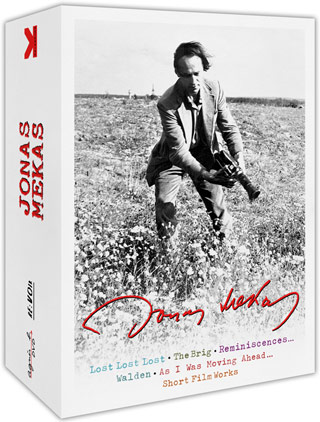
Six-DVD Box Set: The Major Works
All-zone (region 0), PAL DVDs
with English, French and Lithuanian subtitles
This box brings together the key works of Jonas Mekas, one of the most prolific avant-garde film artists and an acclaimed poet. Born in Lithuania in 1922, chased west by Soviet and Nazi forces, Mekas and his brother spent four years in German displaced persons' camps before arriving in New York in 1949 where they started shooting 16mm films on exile, military domination and poetic freedom. Jonas developed his diary style of filmmaking while busying himself as a film critic, programmer, organizer and distributor.
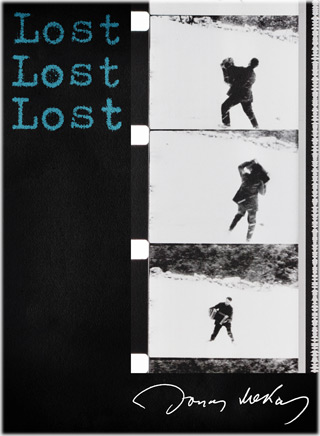
|
The Brig
1964, 65 min. |
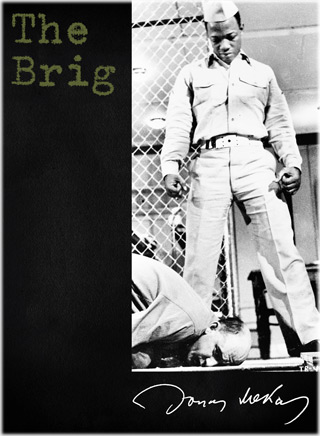
|
Walden: Diaries, Notes, and Sketches
1969, 180 min. |
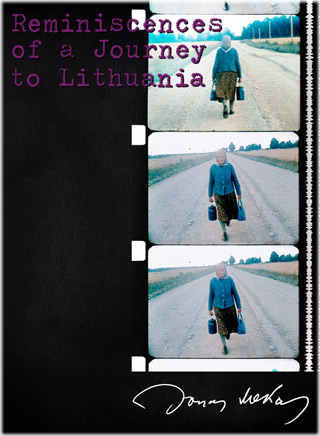
|
Reminiscences of a Journey to Lithuania
1972, 82 min. |
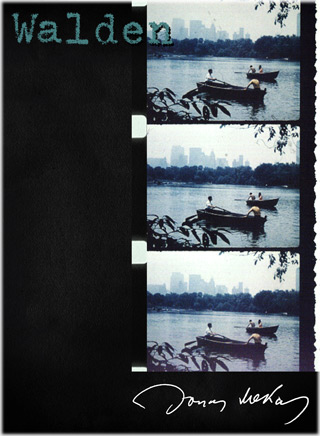
|
Lost Lost Lost 1976, 178 min. |
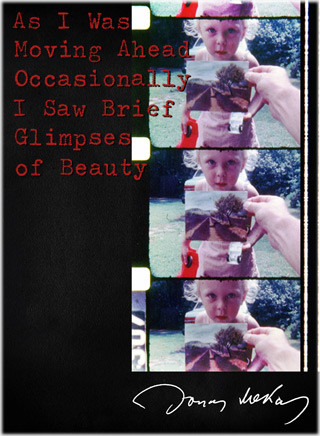
|
As I was Moving Ahead Occasionally I Saw Brief Glimpses of Beauty
2000, 285 min. |
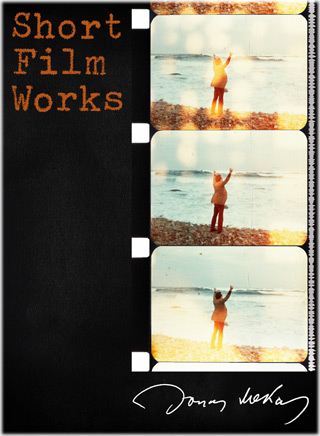
|
Short Film Works
Cassis (1966, 4 min.) |

The Brig
1964, 65 min.
16mm, black & white
All-zone (region 0), PAL DVD
with English, French and Lithuanian subtitles
"I went to see The Brig, the play, the night it closed. The Becks were told to shut down and get out. The performance, by this time, was so precisely acted that it moved with the inevitability of life itself. As I watched it I thought: Suppose this was a real brig; suppose I was a newsreel reporter; suppose I got permission from the U.S. Marine Corps to go into one of their brigs and film the goings-on: What a document one could bring to the eyes of humanity! The way The Brig was being played now, it was a real brig, as far as I was concerned. This idea took possession of my mind and my senses so thoroughly that I walked out of the play. I didn't want to know anything about what would happen next in the play; I wanted to see it with my camera. I had to film it."
-- Jonas Mekas
"Unrelieved by one whit of lightness or compassion, this harrowing screen exercise depicts the methodical, round-the-clock fiendishness inflicted on 10 prisoners by three guards, all of it apparently in the line of duty."
-- The New York Times
"The Brig is a raw slice of new American cinema filmed in an off-Broadway stage with such brutish authenticity that it won a Venice festival grand prize as best documentary. Part drama, part polemic, with shock-wave sound and a nightmare air that suggests Kafka with a Kodak, the movie does exactly what it sets out to do - seizes an audience by the shirtfront and slams it around from wall to wall for one grueling day in a Marine Corps lockup."
-- Time Magazine, September 1964
"When leaving this film, one promises never to see it again. For it seems impossible to watch such a spectacle twice. The film is hard like a nut, and the only thing to do is crush it, without ever asking if this nut is a symbol of the universe. The Mekas brothers are no longer the gentle poets that we thought they were: they are two wild Indians drying scalps."
-- Cahiers du Cinema
"The Brig is a modern Inferno. The men who enter it abandon all hope of mercy. Here, hell is a Marine Corps prison in which humiliation and brutality are dished out according to the book, with guards and inmates performing a mad ritual of degradation... A metaphor of protest against man's meaningless inhumanity to man, The Brig by Kenneth H. Brown, began as a production of the Living Theater, New York's most important avant-garde company. When tax collectors closed its tiny second-foor auditorium in Greenwich Village, Jonas Mekas, editor of Film Culture and reporter on the New American Cinema for the Village Voice decided that the play had to be preserved on film. To do this, director Judith Malina and her actors had to break into their own theater during the night for one last performance (with no retakes) for the benefit of Mekas' cameras... From the moment they awake, the prisoners are at rigid attention. Throughout the men are taunted and beaten by the guards, who often don't even require a pretext for their brutality. What Brown shows so damningly is the insanity that results when a form of government permits men to have other unchecked power over other men. The guards have been turned into sadistic monsters. One is left with the sense of the sheer stupidity of the penal system, for what it accomplishes is not punishment but the destruction of the individual."
-- Los Angeles Times, August 1965

Walden: Diaries, Notes, and Sketches
1969, 180 min.
16mm, color
All-zone (region 0), PAL DVD
with English, French and Lithuanian subtitles
"Since 1950 I have been keeping a film diary. I have been walking around with my Bolex and reacting to the immediate reality: situations, friends, New York, seasons of the year. On some days I shot ten frames, on others ten seconds, still on others ten minutes. Or I shot nothing. When one writes diaries, it's a retrospective process: you sit down, you look back at your day, and you write it all down. To keep a film (camera) diary, is to react (with your camera) immediately, now, this instant: either you get it now, or you don't get it at all. To go back and shoot it later, it would mean restaging, be it events or feelings. To get it now, as it happens, demands the total mastery of one's tools (in this case, Bolex): it has to register the reality to which I react and also it has to register my state of feeling (and all the memories) as I react. Which also means, that I had to do all the structuring (editing) right there, during the shooting, in the camera. All footage that you'll see in the Diaries is exactly as it came out from the camera: there was no way of achieving it in the editing room without destroying its form and content.
"Walden contains materials from the years 1965-69, strung together in chronological order. For the soundtrack I used some of the sounds that I collected during the same period: voices, subways, much street noise, bits of Chopin (I am a romantic), and other significant and insignificant sounds."
-- Jonas Mekas
"Jonas Mekas's films celebrate life. They rise up against the world's overwhelming commercialism, attempting instead to revive the pleasures of friendship, a first snowfall or the return of Spring. Mekas's genius stems from his generously including the viewer in his vision of the world, allowing us to (re)discover, in a simple image, the incredible force and necessity of poetry."
-- Yann Beauvais

Reminiscences of a Journey to Lithuania
1972, 82 min.
16mm, color
All-zone (region 0), PAL DVD
with English, French and Lithuanian subtitles
After a twenty-seven year absence, Adolfas and his brother Jonas returned to their birthplace in Lithuania. They had left Lithuania as young men, destined for a German labor camp. Now they came home for a visit, Adolfas with his wife, the singer Pola Chapelle.
"The film consists of three parts. The first part is made up of footage I shot with my first Bolex, during my first years in America, mostly from 1950-1953. It shows me and my brother Adolfas, how we looked in those days; miscellaneous footage of immigrants in Brooklyn, picnicking, dancing, singing; the streets of Williamsburg.
"The second part was shot in August 1971, in Lithuania. Almost all of the footage comes from Semeniskiai, the village I was born in. You see the old house, my mother (born 1887), all the brothers, goofing, celebrating our homecoming. You don't really see how Lithuania is today: you see it only through the memories of a Displaced Person back home for the first time in twenty-five years.
"The third part begins with a parenthesis in Elmshorn, a suburb of Manburg, where we spent a year in a forced labor camp during the war. After the parenthesis closes, we are in Vienna where we see some of my best friends - Peter Kubelka, Hermann Nitsch, Annette Michelson, Ken Jacobs. The film ends with the burning of the Vienna fruit market, August, 1971."
-- Jonas Mekas

Lost Lost Lost
1976, 178 min.
16mm, color and black & white
All-zone (region 0), PAL DVD
with English, French and Lithuanian subtitles
"These six reels of my film diaries come from the years 1949-1963. They begin with my arrival in New York in November 1949. The first and second reels deal with my life as a Young Poet and a Displaced Person in Brooklyn. It shows the Lithuanian immigrant community, their attempts to adapt themselves to a new land and their tragic efforts to regain independence for their native country. It shows my own frustrations and anxieties and the decision to leave Brooklyn and move to Manhattan. Reel three and reel four deal with my life in Manhattan on Orchard Street and East 13th St. First contacts with New York poetry and filmmaking communities. Robert Frank shooting The Sin of Jesus. LeRoi Jones, Ginsberg, Frank O'Hara reading at The Living Theatre. Documentation of the political protests of the late fifties and early sixties. First World Strike for Peace. Vigil in Times Square. Women for Peace. Air Raid protests. Reel five includes Rabbit Shit Haikus, a series of Haikus filmed in Vermont; scenes at the Film-Maker's Cooperative; filming Hallelujah the Hills; scenes of New York City. Reel six contains a trip to Flaherty Seminar, a visit to the seashore in Stony Brook; a portrait of Tiny Tim; opening of Twice a Man; excursions to the countryside seen from two different views; that of my own and that of Ken Jacobs whose footage is incorporated into this reel.
The period I am dealing with in these six reels was a period of desperation, of attempts to desperately grow roots into the new ground, to create new memories. In these six painful reels I tried to indicate how it feels to be in exile, how I felt in those years. These reels carry the title Lost Lost Lost, the title of a film myself and my brother wanted to make in 1949, and it indicates the mood we were in, in those years. It describes the mood of a Displaced Person who hasn't yet forgotten the native country but hasn't gained a new one. The sixth reel is a transitional reel where we begin to see some relaxation, where I begin to find moments of happiness. New life begins. What happens later, you'll have to see the next installment of reels ..."
-- Jonas Mekas
"No figure appears more firmly rooted in both the American avant-garde and downtown New York than Jonas Mekas: original film critic of The Village Voice; founder of the Film-Makers' Cooperative, Anthology Film Archives, and Film Culture; mentor to generations of experimental artists. Yet Lost Lost Lost, his newly restored three-hour diary collage, tells a very different story, one of exile, displacement, and longing. It was completed in 1976 out of footage shot during an almost 15-year span, from his arrival in New York in 1949 (as a postwar Lithuanian refugee) to his engagement with the budding independent film scene of the early '60s. Assembled in a rough chronology, the cinematography evolves along with Mekas's artistic community: The earliest scenes, taken in an immigrant enclave Williamsburg of cobbled streets, trolley tracks, and hand-lettered storefronts, echo the European art film of montage, while later moments shot in Manhattan and upstate sing with the expressive handheld camerawork of the New American Cinema. Frames flutter through anti-Vietnam War protests and cinematheque screenings, woodland romps and seaside pleasures.
"The effects of Mekas's autobiographical 16mm reminiscences are quite distinct from the real-time immediacy of video diarists like Michel Auder, Sadie Benning, or Robert Frank (who appears briefly, shooting his own 1961 short The Sin of Jesus, in a chicken coop): The thingness of celluloid provides a more tactile index of loss, underscored by intertitles that speak from decades later ("I am trying to remember," reads one). These are gnomic records of self-discovery, sealed in celluloid amber by their very act of creation. But this potently intimate epic transcends mere personal record to tap a universal sentiment. A photographic Homer of his own odyssey, Mekas journeys-like us all-in irrevocable exile from his own past, attempting to reconstruct that invisible nation of youth to which he can never return."
-- Ed Halter, The Village Voice

As I was Moving Ahead Occasionally I Saw
Brief Glimpses of Beauty
2000, 285 min.
16mm, color
All-zone (region 0), 2 PAL DVDs
with English, French and Lithuanian subtitles
"As I Was Moving Ahead... is a record of subtle feelings, emotions, daily joys of people as recorded in the voices, faces and small everyday activities of people I have met, or lived with, or observed -- something that I have been recording for many years. This, as opposed to the spectacular, entertaining, sensational, dramatic activities which dominate much of the contemporary film-making.
"Now, all this has to do with my understanding and belief of what acts really affect the positive changes in man, society, humanity. I am interested in recording the subtle, almost invisible acts, experiences, feelings, as opposed to the tough, harsh, loud, violent activities and political actions, and especially, political systems of our time. As a film-maker, I am taking a stand for the politics that have been practiced by some of the artists of my generation who believe that more essential, positive contributions to the upholding and furthering of the best in humanity, have been made, say, by John Cage or Albert Camus, and not by the great political figures of the 20th century.
"The film is not conceived as a documentary film, however. It follows a tradition established by modern film poets. I am interested in intensifying the fleeting moments of reality by a personal way of filming and structuring my material. A lot of importance is being given to color, movement, rhythm and structure -- all very essential to the subject matter I am pursuing. I have spent many years developing and perfecting a way of catching the immediacy without interfering with it, without destroying it. I believe that some of the content that I am trying to record with my camera and share with others, can be caught only very indirectly though the intensity of personal involvement."
-- Jonas Mekas
"As I Was Moving Ahead serves not just as a meditation on the nature of cinema, beauty, and time, but also as a monument to the bonds of family and friends. Mekas's diaries have always quivered with the tensions between past and present. This one, created by an artist soon to enter his eighth decade, finds a secret paradise in the rich harvests of a lifetime's memories."
-- Village Voice
"'It's the ultimate Dogme movie, before the birth of Dogme,' is how 79-year-old Lithuanian-born independent mainstay Jonas Mekas describes peaceful, enthralling assemblage encompassing home movie footage from last three decades of his life. Length and style may deter pic's prospects, but won't inhibit auds bold enough to spend four hours and 48 minutes with the godfather of a key movement in the American avant-garde. Divided into chapters of varying lengths and intercut with title cards announcing 'life goes on,' 'this is a political film' and the like, Mekas invites the viewer to share his love of his wife and children through the years as well as New York City in its various meteorological moods. Glimpses of avant-garde colleagues P. Adams Sitney, Hollis Frampton and others are mixed with views from his travels to Vermont, Italy, New Hampshire and Cape Cod. Tech credits are consistent with Mekas' lifelong aesthetic of immediate, intimate filmmaking, composed and edited to convey the energy and love they give him. Title card actually reads 'As I Moved Ahead...,' but, fittingly, filmmaker prefers the past continuous tense -- a far more optimistic assessment of time's passage."
-- The New York Times
"Peter Kubelka once said of his friend, 'Jonas has realised that, whatever paradise there is, it should be here and now. Loving care is a key to it.' As I Was Moving Ahead is a loving portrait of Mekas' early family life, a song of beauty and a testament to the possibility of Paradise. Appropriately, Mekas concludes the film in song, accompanied by his tireless accordion:
I do not know where I am, and going to, where I am coming from. I have seen some beauty. Glimpses of beauty and happiness. Yes, la beauté. And it is still beautiful in my memory. And it is real, as real as this film."
--Senses of Cinema

Short Film Works
All-zone (region 0), PAL DVD
with English, French and Lithuanian subtitles
Cassis (1966, 4 min.)
Notes on the Circus (1966, 12 min.)
Hare Krishna (1966, 4 min.)
Report from Millbrook (1965-66, 12 min.)
Time and Fortune Vietnam Newsreel (1968, 4 min.)
Travel Songs (1967-81, 25 min.)
Quartet Number One (1991, 8 min.)
Imperfect Three-Image Films (1995, 6 min.)
Song of Avignon (1998, 5 min.)
Mozart, Wien & Elvis (2000, 3 min.)
Williamsburg (1949-2002, 15 min.)
This compilation of short film works brings together Jonas Mekas' many forms of expression throughout his career. At times funny, subversive, provocative, ironic, and fundamentally free, this panorama also shows us the sharp eye and acerbic wit that makes Jonas Mekas more than a filmmaker: a lover of life and people that he embraces with his camera, whose montages sing of eternity.
"Mr. Mekas's technique is to point his camera at whatever strikes his fancy and edit it later into a work in which certain visual motifs and moods emerge, with the formal structure kept loose and open-ended. The images fly by in a vertiginous blur until the camera stops to catch its breath and linger momentarily on a particular scene before the race resumes. These fragments have the impatient rhythm of someone trying to swallow the world in one ravenous gulp."
-- The New York Times
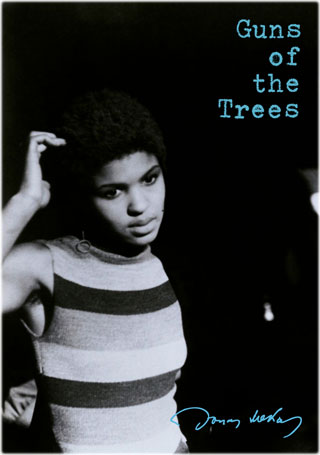
Guns of the Trees
1962, 87 min.
35mm, black & white
All-zone (region 0), PAL DVD
with English, French and Lithuanian subtitles
Guns of the Trees deals with the thoughts, feelings, and anguished strivings of my generation, faced with the moral perplexity of our times. Conceived as an episodic, horizontal film, there is no apparent direct story connection between one scene and the next. The scenes act like pieces of a larger, timed, emotional mosaic. Where the direct word, or the direct image, fails — when we come to more essential things — the indirectness of the poet will seize the essence and the truth.
-- Jonas Mekas
It is a bitter but lyric work. It is also revolutionary in form, being unlike, in its technique, anything you ever saw. It is a poster, a declaration, a manifesto. I regard Guns of The Trees as the most important film by far of the American “New Wave.”
Herman G. Weinberg
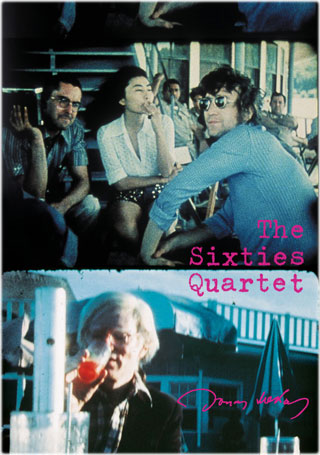
Sixties Quartet
All-zone (region 0), PAL DVD
with English, French and Lithuanian subtitles
SCENES FROM THE LIFE OF ANDY WARHOL: FRIENDSHIPS AND INTERSECTIONS, 1990, 35’
Jonas Mekas is know for his rapid-fire diary films. His Scenes from the Life chronicles not only Andy Warhol, but also the social and cultural excitement that swirled around him, throbbing to a hypnotic Velvet Underground beat.
ZEFIRO TORNA OR SCENES FROM THE LIFE OF GEORGE MACIUNAS, 1992, 35’
“Bits of Fluxus events and performances, and picnics with friends (Almus, Andy Warhol, John Lennon, Yoko Ono, etc.), George’s wedding and footage I took of him in Boston hospital three days before he died.”
-- Jonas Mekas
HAPPY BIRTHDAY TO JOHN, 1995, 24' with John Lennon and Yoko Ono
“On october 9th, 1972, half of the music world gathered in Syracuse, N.Y., to celebrate the opening of John Lennon/Yoko Ono Fluxus show, designed by George Maciunas. Same day, a smaller group gathered in a local hotel room to celebrate John’s birthday.”
-- Jonas Mekas
THIS SIDE OF PARADISE, 1999, 35' with Jackie, Caroline and John Kennedy Jr.
"I had the fortune to spend some time, mostly during the summers, with Jackie Kennedy’s and her sister Lee Radziwill’s families and children. Cinema was an integral, inseparable, as a matter of fact, a key part of our friendship."
-- Jonas Mekas

A Letter from Greenpoint
2004, 80 min.
video, color
All-zone (region 0), PAL DVD
with English, French and Lithuanian subtitles
In February 2004, after 30 years of my life in SoHo, I made a decision to leave SoHo and move to Greenpoint, Brooklyn. This video is about what it feels like to leave a place in which one has spent more time than any other place, and which was also the place of my family life. I am somewhere else now. It's about beginning of growing roots in a new place, new home, with new friends, new thoughts, experiences.
But this video is also about video. I will let Dominique Dubosc, my good Paris friend, alk for me, in a recent letter: "I think you finally mastered this bloody video camera that was for so long (still is for most people) no more than a tape recorder. Now it is the eye-camera the Kinoks had been dreaming of. Of course, it is not only a question of mastering the camera. What is more important is the energy behind. The movement of life embracing death itself. It gave me such a push that I feel on the move again. Thank you." What Dominique meant, and what I mean, is this: When in 1949 I began filming with my Bolex, it took me fifteen years to really master it so that my Bolex would do for me what I wanted. When in 1987 I got my first Sony camera I thought it would be different. But no. Only today, after working with the video camera for fifteen years, I feel like it had become an extension of my eye, my body, A Letter from Greenpoint being my first real video work.
-- Jonas Mekas
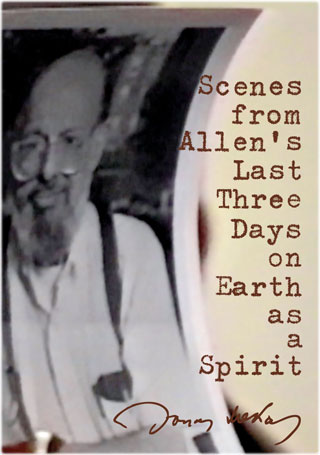
Scenes from Allen's Last Three Days on
Earth as a Spirit
1997, 67 min.
video, color
All-zone (region 0), PAL DVD
with English, French and Lithuanian subtitles
The video Jonas is bringing us today was shot in New York in 1997 during the three days following Ginsberg’s death, in the new loft into which he had recently moved, at the very spot where he died. It is the last encounter, trou- bled and troubling, between these two extraordinary and oversized minds, each of whom were able to forge a unique destiny.
-- Jean-Jacques Lebel
This is a video record of the Buddhist wake ceremony at Allen Ginsberg's apartment. You see Allen, now asleep forever, his close friends, and the Buddhist monks conducting the cere- mony, preparing Allen for the travel into the spirit world. You also see Allen being wrapped up and removed from the apartment to the Buddhist Temple. I talk to Peter Orlovsky about Allen's last days. Later I tape the final farewell at the Buddhist Temple, 118 West 22nd Street, New York City, and many of Allen's friends, Patti Smith, Gregory Corso, Peter Orlovsky, Le Roy Jones- Baraka, Hiro Yamagata, Anne Waldman, and many others who came to say last good-bye to Allen.
-- Jonas Mekas
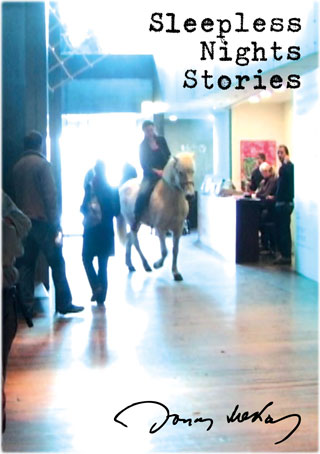
Sleepless Nights Stories
2011, 114 min.
video, color
All-zone (region 0), PAL DVD
with English, French and Lithuanian subtitles
This film originated from my readings of the One Thousand And One Nights. But unlike the Arabian tales, my stories are all from real life, though at times they too wander into somewhere else, beyond the everyday routine reality.
There are some twenty-five different stories in my movie. Their protagonists are all my good friends and I myself am an inseparable part of the stories. The storyteller of the Arabian Nights was also part of his or her tales.
Some of the people in the movie you’ll recognize, some not. The fact that some of them you’ll recognize has no bearing on the stories: after all, we all recognize John Wayne or Annette Bening, but in their stories they are no longer the people we know.
The subjects of the stories cover a wide range of emotions, geographies, personal anxieties, anecdotes. These are not very big stories, not for the Big Screen: these are all personal big stories... And yes, you’ll also find some provocations... But that’s me, one ‘me’ of many. The very question “What is a story?” is a provocative question.
-- Jonas Mekas